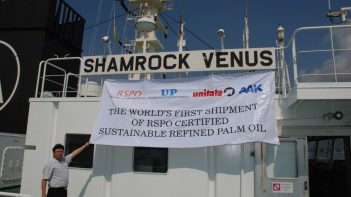The RSPO launches new traceability and transparency tools and discloses new data showing positive momentum among its members at Milan conference. Trust and transparency are key to scaling up the uptake of certified sustainable palm oil and meeting climate commitments
International, June 9, 2016 – The 2016 results of the RSPO Annual Communication of Progress (ACOP), announced today at the RSPO EU Roundtable event in Milan, confirm an increase in commitments to certified sustainable palm oil. In 2016 the number of ACOP submissions by RSPO members increased to 75%, compared to 68% in 2015. The number of voluntary submissions (for organisations which purchase no more than 500 metric tonnes of palm oil annually) has also more than doubled since 2015. RSPO membership has also grown by 15% since 2015 and now stands at 2852.
The conference saw also the launch of new RSPO transparency tools:
- An improved traceability system which now allows the identification of the mill of origin for all certified sustainable palm oil, in all the RSPO supply chain systems: identity preserved, segregated, mass balance and as of 2017 also for RSPO credits.
- A new mobile phone application, which will allow consumers to find RSPO certified products, wherever they are in the world. The application is crowd-sourced as anyone can upload new certified products bearing the RSPO Trademark in its catalogue.
To help companies scrutinise their supply chain, the World Resources Institute (WRI) launched their new PALM Risk Tool, this tool is designed to help companies identify the risk of deforestation associated with a particular palm oil mill and its supply base.
Trust and transparency are key to transforming the global palm oil market and RSPO certification is an essential tool for enabling companies to implement their sustainability and climate change commitments. This was the main message heard at the Roundtable on Sustainable Palm Oil’s (RSPO) fourth European Roundtable event, “100% Certified Sustainable Palm Oil by 2020: A Climate Change Imperative”, attended by some 300 government representatives, NGOs, retailers, food manufacturers, investors, academics, and oil growers and traders.
Globally agriculture contributes about 13% of all GHG emissions and it is vital to identify effective means to reduce those emissions. Switching to sustainable agriculture and CSPO is part of the solution to reconciling forest preservation and the need to produce food for the world’s growing population.
Cooperation and joint efforts from all stakeholders, in producer and consumer markets, are essential to meeting commitments to mitigating the impact of climate change and reaching the European targets of 100% certified sustainable palm oil by 2020.
Opening the conference, Adam Harrison, Senior Policy Officer for Food and Agriculture, WWF and Member of the RSPO Board of Governors, stated: “The scale and the urgency of the challenge facing the industry means that we will only succeed if we collaborate – each of us running off in our own different directions may take the pressure off each of us as individual companies but it will not add up the global transformation.”
Governments also have a role to play. Paolo de Castro, Member of the European Parliament Committee on Agriculture, explained that palm oil’s sustainability is also on the EU agenda: “Discussions are ongoing both in the European Parliament and the European Commission about the most appropriate response to this issue at the EU level. CSPO represents a great opportunity to lead the market transformation. With everyone’s support we need to do our best to consolidate all efforts of EU member states and industries to increase the uptake of CSPO and create a European commitment.”
Jose Maria Madrid, a smallholder from Honduras commented: “We are calling on the European manufacturers and retailers to continue purchasing CSPO to support our sustainability efforts. Without an incentive from European companies smallholders can’t afford to receive and maintain certification.”
The EU imported some 6,700,000 tonnes of palm oil in 2015, making it the 2nd largest import market after India. Europe is home to some of the world’s largest companies and brands and consumers increasingly are demanding sustainable palm oil. Achieving 100% market uptake in Europe will incentivise more palm oil producers and smallholders to become RSPO certified sustainable.
Fresh RSPO data, presented at the conference, show that of 2.8 million tonnes of RSPO certified palm oil sold in 2015, an estimated 1.9 million tonnes were shipped to Europe.
Darrel Webber, RSPO’s Chief Executive Officer, stated: “Trust and transparency are the cornerstones of our collaboration in the sustainable palm oil supply chain. If we don’t trust each other, we can’t work together. And if we don’t work together, we will never be able to make the global palm oil market sustainable. Third party certification and voluntary disclosure of supply chain information for public scrutiny are essential elements to win the trust of all stakeholders and consumers who want to be reassured that companies’ sustainability policies are genuine.”
Keep reading
Call for Proposal: Study on Wild Palms in West and Central Africa

RSPO hosts first Africa downstream sustainable palm oil supply chain forum in Cape Town

Nearly two decades on, Europe continues to drive global demand for RSPO Certified Palm Oil

Communicating Sustainable Palm Oil - examples of success across Europe
[EOT] Terms of Reference: Independent Smallholders Outreach Programme in Indonesia

RT2023 Delegates Propose Solutions to Reinforce RSPO’s Assurance System – End-Year Highlights of Assurance Standing Committee
RSPO UK Members' Day Examines Shifting Dynamics of Doing Business within Europe

Celebrating 20 Years of RSPO’s Sustainability Journey




